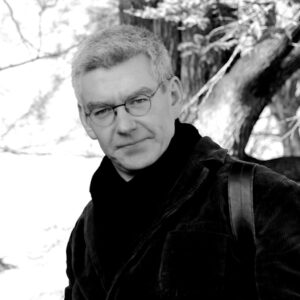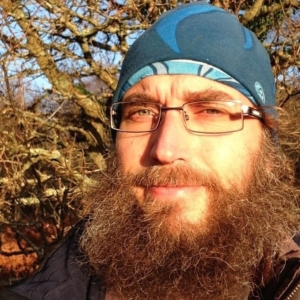In our latest episode of SocialEx, Humentum’s monthly podcast, we speak with Julian Stodd, a pioneering voice on social age thinking. Julian is the founder of Sea Salt Learning, a global consultancy active in social learning, social leadership, and learning design. In this fascinating conversation he covers power, failure, leadership, learning and growing, the intersection of art and science, and more.
This is an abridged transcript of their conversation; listen to the entire podcast or watch the video embedded below.
George Miller (Humentum host): You’ve written a series of handbooks and workbooks looking at the social age, different aspects of leadership, and organizational learning.. I observed that in your work, illustration is part of the way you explore the world and ideas, and I think that’s part of what makes it memorable.
Julian Stodd: I have produced an awful lot of work and an awful lot of it isn’t that good, which is okay because the key advantage I have in the space that I’m in is I have an almost unlimited permission to be wrong. I’m not really all that accountable to anybody, at least in general terms. Occasionally it’s not bad at all. But quite often things just fade away, they gently change and iterate and that’s part of my process of working – a methodology called Working Out Loud. You share your work as it evolves, but what it really means is you try to claim permission never to take the exam. Your thinking can be constantly evolutionary.
George Miller: The idea of Working Out loud has been inspirational to Humentum Learning Services and inspires its monthly Working Out Loud sessions. Do you think about how to help people overcome the initial trepidation when presented with the idea of Working Out Loud?
Julian Stodd: Most of our thoughts and ideas become outdated over time. Learning professionals are very disparaging about learning styles and tend to disparage people who continue to talk about it, either because they interpret the evidence differently or simply because they’ve not yet learnt to look at the world in a different way. I used to firmly believe in learning styles. I spent six years of my postgrad research trying to sort of make sense of it. It fell into that dangerous trap of being very intellectually appealing. If I hadn’t had the opportunity to make my mistakes, to learn to evolve my thinking, I’d never have moved beyond that. Any time we judge others for their thinking, we essentially remove their permission to rehearse. And you cannot go from learning into performance without rehearsal.
George Miller: This iterative approach, does it sort of reveal that certain tools are right for certain jobs at certain times, or is it more of a bigger paradigm shift?
Julian Stodd: The thing which is most important is your fundamental [learning] methodology, how you understand people learn, how you carry that into the space of organizational learning. And what our role is to enable and facilitate learning to happen. It’s a bit like being an artist…I remember writing to the Vice Chancellor of one of the universities once because I’d had three graduates from that institution into my organization and all they seemed to come with was software skills. They didn’t have any concept of the critical thinking or the underlying methodology of learning. Everything else you can learn, buy, or borrow. But understanding fundamentally where you’re coming from, how you are coming to it and how you enable and support people to learn is important.
George Miller: You come up at the top on Google search results for Social Age Thinking – most people would say we’re living in the digital age, and you counter-pose something different. Tell us more.
Julian Stodd: I write about the social age because I love technology and I’m very interested in where technology takes us, but that’s precisely it. I’m interested in where it takes us. It’s a different way of being human. We are connected to each other in different ways. We are effective in different ways within organizations and structures that are evolving. Almost all of it because of technology. I just choose to focus the light slightly differently on the human-social side of it…it’s worth remembering that our human social structures, organizations, law courts, police forces, the ways that we farm, the ways that we run shops, markets, money, it’s all made up. It’s not like gravity, it’s not innate.
The systems that served us yesterday tell us precisely one thing – that they served us well yesterday. As the context continues to change, it is highly likely we will need new types of systems. So in the context of the social age, we will need new types of organizations.
George Miller: In a world that drowns out quiet voices, how can leaders begin to think about what it means to be a humble leader?
Julian Stodd: Quiet Leadership – it’s very small, gentle work set in the backdrop of the organization ecosystem…it’s my most simple work, and in fact, it’s my shortest work in many ways. The Humble Leader book is under three and a half thousand words long and yet it took the longest to write…It looks at humility, kindness, fairness and a notion of grace – not in a religious sense. It’s from graceful and fluid motion.
The work was originally called Imperfect Leadership. It’s about how do we lead imperfect humans within imperfect systems…I’m very clear in the Humble Leader, “there’s no answers in this book”. So you should absolutely reject parts of it. On my des,k I have some pages that people have torn up and added notes to have sent back to me. And I love that.
A true learning organization is one that is great to learn in, but which also learns itself… It’s not rare to find this in pockets, but it is rare to find it overall.
We have to figure out for ourselves what we’re going to think. We can share the parameters, the landscapes we are exploring. That’s what I try to do with that work.
George Miller: What is the stage that comes after the questioning, the dismantling of the old? How do you then move forward?
Julian Stodd: The learning pillar of our work is about the role of disturbance in learning. How do you use that disturbance to ensure that people leave within a narrative of change? If you leave people with disturbance at the end, it’s unsafe. If you introduce disturbance too early, you make it too safe too soon. You have to give people the opportunity to make that journey.
And in my design and delivery of work, I use levels of narrative: personal narratives, co-creative narratives, and formal organizational narratives, exploring the tensions between them and then moving into looped practice action research cycles. So don’t find the answer but find an answer that is good enough for this cycle and then ensure you have the space, the provocation, and the community to take it apart again and come back with a new answer for a new cycle. And crucially, share what you’re doing in the quiet leadership work in that organization and ecosystem.
Are you seeking resources to help turn your organization into a true learning organization?


